
Economics of Transition and Institutional Change
Scope & Guideline
Illuminating pathways of economic transition and institutional growth.
Introduction
Aims and Scopes
- Economic Transition Mechanisms:
Explores the processes and strategies through which economies transition from centrally planned to market-oriented systems, including the role of reforms, privatization, and institutional frameworks. - Institutional Change and Development:
Investigates how institutional frameworks adapt or evolve in response to economic changes and the implications of these developments for economic growth, governance, and social equity. - Impact of Policies on Economic Outcomes:
Analyzes the effects of various economic policies, including monetary, fiscal, and trade policies, on different aspects of economic performance, such as growth, inequality, and innovation. - Sectoral Analyses:
Focuses on specific sectors (e.g., labor markets, banking, technology) to understand the unique challenges and opportunities within these areas during periods of transition. - Regional Studies:
Conducts comparative analyses across different regions, particularly focusing on Central and Eastern Europe, Asia, and Africa to derive insights relevant to local contexts.
Trending and Emerging
- Digital Economy and E-commerce:
Recent publications increasingly focus on the role of digital platforms and e-commerce in economic development, highlighting their impact on entrepreneurship, labor markets, and regional growth. - Environmental and Sustainable Development:
There is a rising trend in research examining the intersection of economic growth and environmental sustainability, addressing issues such as climate change, resource management, and sustainable practices. - Gender and Economic Empowerment:
Emerging research themes focus on the relationship between gender dynamics and economic empowerment, particularly in transitional economies, reflecting global movements towards gender equality. - The Role of Informality in Economic Development:
Studies exploring the implications of informal economies on growth and development are gaining traction, emphasizing the complexities and challenges posed by informal sectors in transitional contexts. - Impact of Global Crises on Institutional Change:
The journal is increasingly publishing research that examines how global crises, such as the COVID-19 pandemic, affect institutional frameworks and economic resilience, suggesting a shift towards understanding adaptive mechanisms.
Declining or Waning
- Traditional State-led Growth Models:
Research centered on traditional models of state-led growth has decreased, possibly due to a growing recognition of the importance of market mechanisms and private sector involvement in driving economic progress. - Overemphasis on Historical Case Studies:
While historical analyses provided valuable insights, there appears to be a diminishing trend in studies solely focused on historical case studies, shifting towards more empirical and contemporary analyses. - Corruption and Governance Issues:
Although still relevant, the frequency of papers specifically dedicated to corruption as a standalone theme has declined, indicating a potential shift towards integrating governance issues within broader economic analyses rather than treating them as isolated topics. - Macro-Level Economic Indicators:
Studies focusing exclusively on macroeconomic indicators without considering institutional or microeconomic factors have become less frequent, as there is a growing emphasis on nuanced, multi-dimensional analyses.
Similar Journals

Malaysian Journal of Economic Studies
Unveiling New Perspectives on Economic PhenomenaMalaysian Journal of Economic Studies is a prominent peer-reviewed academic journal dedicated to advancing the field of economics, econometrics, and finance. Published by PERSATUAN EKONOMI MALAYSIA, this journal has been a vital platform for scholarly research since its inception, with a publication history spanning from 2007 to 2024. With an impressive Q3 quartile rank in the Economics, Econometrics, and Finance category and a Scopus ranking that places it in the 44th percentile among its peers, the journal serves as a critical conduit for disseminating innovative economic research and findings that can inform policy-making and academic discourse. Although it currently does not offer Open Access, it remains committed to enhancing the visibility of economic research in Malaysia and beyond. Scholars, practitioners, and students alike will find this journal a valuable resource that not only reflects the evolving economic landscape but also contributes to a deeper understanding of economic phenomena on a global scale.
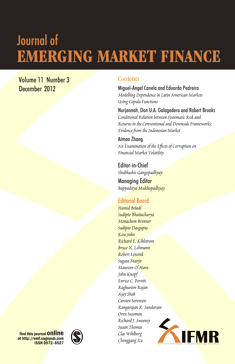
Journal of Emerging Market Finance
Navigating the Complexities of Financial SystemsThe Journal of Emerging Market Finance, published by SAGE Publications India Pvt Ltd, is a premier academic journal that serves as a vital resource for researchers, professionals, and students in the fields of finance and economics. Established in 2002, this journal focuses on the multifaceted dynamics of emerging market economies and their financial systems. With an ISSN of 0972-6527 and an E-ISSN of 0973-0710, it has garnered attention with its respectable Q3 rankings in both the Economics and Econometrics and Finance categories, reflecting its commitment to high-quality research. Despite its limited open-access options, the journal remains a significant platform for scholarly discussions, providing insights on emerging financial instruments, market behaviors, and economic policies in developing economies. As a continuously evolving publication, it aims to bridge the gap between theory and practice, promoting an understanding of the complexities faced in these vibrant markets, ultimately serving the academic community with relevant and impactful research until 2024 and beyond.
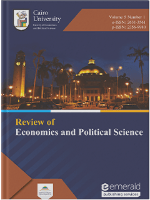
Review of Economics and Political Science
Bridging disciplines to address contemporary challenges.Review of Economics and Political Science, an esteemed publication by EMERALD GROUP PUBLISHING LTD, stands at the forefront of interdisciplinary research, exploring the intricate relationships between economics, political science, and societal dynamics. Since its transition to an Open Access format in 2018, the journal has provided global accessibility to cutting-edge research, fostering a rich dialogue among scholars and practitioners in the fields of Applied Mathematics, Econometrics, and Political Science. With a commendable Q2 ranking in multiple categories including Economics and Political Science, the journal offers a robust platform for high-impact studies that drive innovation and policy development. Located in the United Kingdom, it caters to an international audience and actively contributes to the academic discourse, as evidenced by its solid performance in Scopus rankings. Researchers, professionals, and students alike will find invaluable insights within its pages, making it a vital resource for understanding contemporary economic and political challenges.

Economies
Connecting scholars and practitioners to drive economic progress.Economies is a premier open-access journal published by MDPI, dedicated to advancing the fields of economics, econometrics, and finance since its inception in 2013. With an E-ISSN of 2227-7099, the journal plays a vital role in disseminating high-quality research that addresses contemporary global economic challenges, fostering a collaborative platform for scholars, industry professionals, and policymakers alike. The journal is based in Switzerland and has gained significant recognition in the academic community, evidenced by its Q2 ranking in both Development and Economics, Econometrics and Finance categories, along with impressive Scopus rankings—55th out of 242 in Economics and 79th out of 306 in Social Sciences Development. This positions Economies as a key resource for those seeking to stay at the forefront of economic research and thought leadership. The journal’s commitment to open access ensures that valuable insights and findings are readily available to the global research community, enhancing knowledge sharing and innovation in the field.
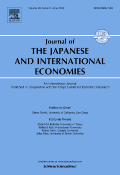
JOURNAL OF THE JAPANESE AND INTERNATIONAL ECONOMIES
Illuminating the Interplay of Local and Global EconomiesJOURNAL OF THE JAPANESE AND INTERNATIONAL ECONOMIES, a prestigious publication from Academic Press Inc. Elsevier Science, has been a vital contributor to the fields of economics, finance, and political science since its inception in 1987. With an impressive impact factor and recognized within the Q2 category for Economics and Econometrics as well as Finance, and Q1 for Political Science and International Relations, this journal serves as a critical platform for peer-reviewed research that influences both academic discourse and policy-making. The journal is indexed in Scopus, evidencing its prominent position within the scholarly community, with notable rankings of #56 in Political Science and #72 in Finance. Authors and researchers are encouraged to submit their work, contributing to the rich tapestry of knowledge surrounding the economic dynamics of Japan and the broader international landscape. Though it does not offer open access, the journal's subscription model ensures a wide dissemination of its impactful articles, making it essential reading for those aimed at deepening their understanding of economic interrelations and current global issues.
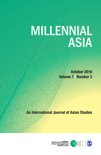
Millennial Asia
Bridging Regional Expertise with Global PerspectivesMillennial Asia is a premier academic journal published by SAGE Publications Inc that serves as a vital platform for interdisciplinary research in the vibrant fields of cultural studies, development, economics, political science, and sociology. With its ISSN 0976-3996 and E-ISSN 2321-7081, the journal provides a comprehensive examination of the socio-economic and political landscapes of Asia, fostering dialogue between regional experts and global scholars. Since its inception in 2014, it has established itself as a significant voice in the academic community, achieving a remarkable quartile ranking of Q1 in Cultural Studies and multiple Q2 rankings in Development, Economics, and Political Science disciplines for 2023. The journal's Scopus rankings further underscore its impact, with notable percentiles in various categories, indicating its commitment to high-quality research. Despite being a non-open access journal, it provides targeted insights and critical analyses that are indispensable for researchers, professionals, and students interested in understanding the complexities of contemporary Asian societies. As it converges towards 2024, Millennial Asia continues to expand its reach and relevance in the rapidly evolving academic landscape.

POLITICKA EKONOMIE
Navigating Contemporary Issues in Political EconomyPOLITICKA EKONOMIE is a prominent academic journal published by VYSOKA SKOLA EKONOMICKA in the Czech Republic, focusing on the intersection of economics, sociology, and political science. Established to foster critical discourse within these fields, the journal's ISSN is 0032-3233, and it operates with an E-ISSN of 2336-8225. With a convergence history dating back to 1980, POLITICKA EKONOMIE has become a valuable resource for researchers and practitioners seeking insights into societal and economic dynamics. Although the journal is categorized in Quartile 4 for both Economics and Econometrics and Sociology and Political Science categories as of 2023, it continues to contribute significantly to empirical research and theoretical advancements. Researchers will find that while the journal is not open access, it welcomes submissions that engage with contemporary issues and debates, thereby promoting academic exchange and innovation in the social sciences.
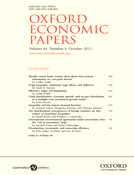
OXFORD ECONOMIC PAPERS-NEW SERIES
Unveiling insights that shape global economic discourse.OXFORD ECONOMIC PAPERS-NEW SERIES is a prestigious academic journal published by Oxford University Press, dedicated to advancing the field of economics and econometrics. With an ISSN of 0030-7653 and an E-ISSN of 1464-3812, this journal has a rich history since its inception in 1938, and continues to play a vital role in disseminating impactful research through its convergence of years spanning from 1938 to 2024. Recognized as a Q2 journal in the 2023 category of Economics and Econometrics, it ranks #396 among 716 in its field according to Scopus, reflecting a commendable position within the academic community, particularly in global economic discussions. While the journal currently does not offer open access options, it remains committed to providing a platform for rigorous research and critical discourse. Researchers, professionals, and students will find the journal's articles to be essential reading, offering insights that are pivotal for understanding economic trends, policies, and methodologies. Its focus on high-quality scholarship ensures that contributions are both theoretically robust and practically relevant, making it a significant resource in the ever-evolving landscape of economic research.

MANCHESTER SCHOOL
Fostering dialogue and discovery in the world of economics.MANCHESTER SCHOOL, published by WILEY, is a leading academic journal in the field of Economics and Econometrics, with a rich legacy dating back to 1930. This esteemed journal fosters scholarly discourse by providing a platform for high-quality research articles that cover a broad spectrum of economic theories, empirical studies, and methodological advancements. With an impact factor reflective of its relevance and rigor, MANCHESTER SCHOOL is ranked in the Q3 category in Economics and Econometrics and holds a Scopus rank of #447 out of 716, placing it in the 37th percentile. Researchers and practitioners alike can access a wealth of knowledge through its diverse range of articles, contributing significantly to the advancement of economic science. While it does not offer Open Access options, the journal maintains a commitment to accessibility by providing in-depth analyses and discussions that are crucial for understanding contemporary economic challenges. Based in the United Kingdom, MANCHESTER SCHOOL continues to uphold its standard of excellence well into 2024 and beyond.

Economic Change and Restructuring
Exploring the dynamics of economic evolution.Economic Change and Restructuring is a prominent journal in the field of Economics and Econometrics, published by Springer. With an ISSN of 1573-9414 and an E-ISSN of 1574-0277, this journal plays a critical role in disseminating research that analyzes transformative economic changes and beneficial restructuring processes that influence global and local economies. The journal has maintained a strong reputation, reflected in its Q2 quartile ranking in 2023 and a commendable Scopus rank of #187 out of 716 in Economics and Econometrics, placing it in the 73rd percentile of its category. Though it does not offer Open Access, it remains a highly regarded resource for academics and practitioners seeking insights into economic dynamics from 1996 to the present. With its commitment to high-quality peer-reviewed articles, Economic Change and Restructuring serves as an essential platform for scholars, professionals, and students keen on exploring complex fiscal phenomena and their implications for policy and practice.